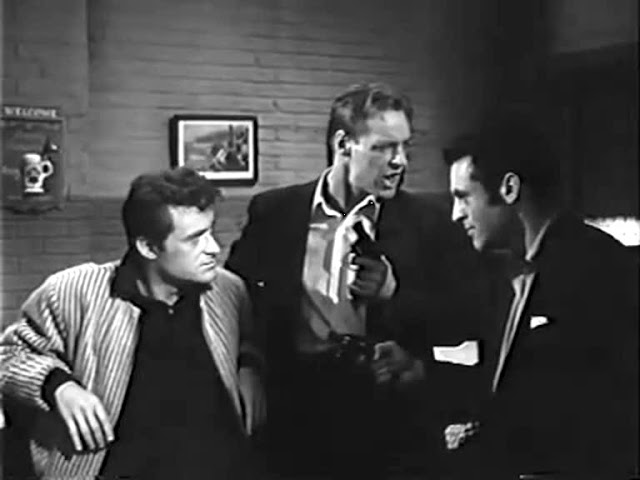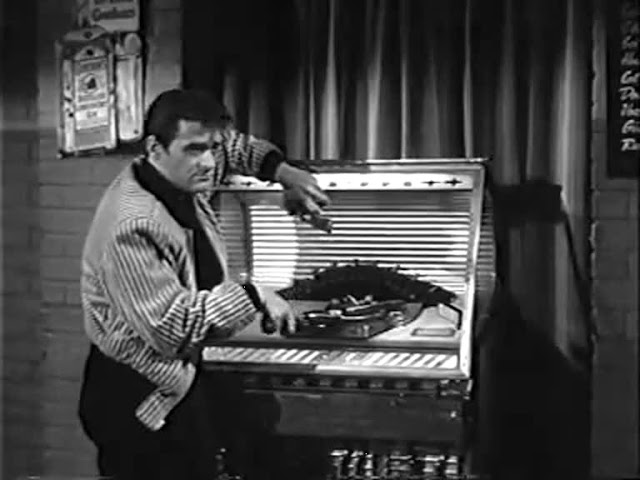
Rock All Night seems at first to be one of those early rocksploitation films, a la Rock Around the Clock (1956) and Don’t Knock the Rock (1957), whose sole purpose was to showcase a sizeable slice of running time to musical performances. The Platters do hog the screen in the film’s first ten minutes, and other performances are scattered throughout. But once Rock All Night’s actual story and quality come into focus, it reveals itself as possibly the ne plus ultra of Roger Corman’s incredible run of no-budget productions of the late ‘50s. It’s one of the few films Corman made at the time which doesn’t fit into any discernible genre – not quite a crime thriller, not quite a comedy, it’s a precursor to the wayside humour and flagrantly self-referential cheapskate atmosphere of Little Shop of Horrors (1960) and the Beatnik satire of A Bucket of Blood (1959), but avoids their ghoulish conceits. It shares the protean nuttiness of immediate predecessor The Undead (1957) as a burlesque that makes fun of its own junk-movie vicissitudes, and starts to feel like the truest mission statement Corman ever composed, by way of his ever-lucid, sly-witted regular scribe Charles B. Griffiths. One of nine – count ‘em, nine – films Corman released in 1957, Rock All Night offers Dick Miller as a diminutive sorehead dubbed Shorty by all and sundry who’s dedicated his life to picking fights with loud-mouths, bullies, and bigger guys in general. He’s ejected from a classy nightspot where The Platters are performing, after needling a rotund drunk and his gal: quite literally picked up by a colossal waiter and hurled out, Shorty is able to start the waiter and the maître d’ fighting in a mini class-war, before he takes refuge in the seamiest bar in town, the dubiously-named Cloud Nine. There the proprietor Al (Robin Morse) sits in court over a motley collection of riff-raff including penniless, pipe-puffing reporter Steve (Richard Cutting), whom he tries to constantly talk into writing a story about his dive. Metaphors for Corman’s place in Hollywood and the safe harbour he offers for his collective of collaborators and actors inevitably ensue.
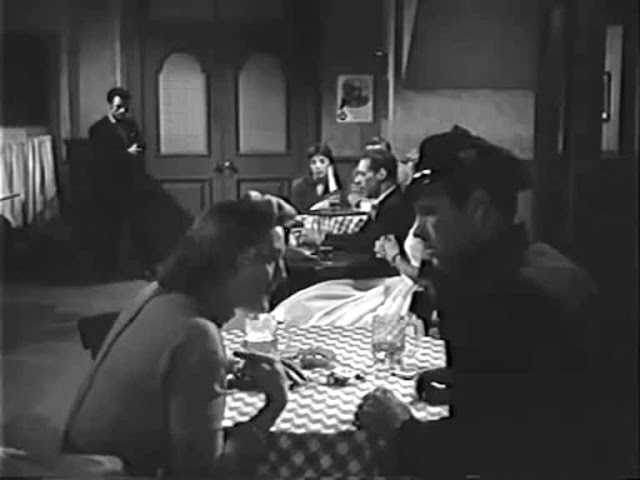
Al’s charmless den offers a stage for performances, except that Al can’t afford to pay any band worth the bread to play. Wannabe Beatnik musical manager Sir Bop (Mel Welles) shunts his latest protégé Julie (Abby Dalton) on that puny platform to try and wow Al as the first step to stardom, but Julie’s vocal bravado keeps failing her in public performing. Shorty delivers a blistering but sympathetic critique when everyone else patronises her, and Sir Bop keeps prodding her to try again, even hauling in the quality band he’s got booked for another lousy joint to give her backing. Meanwhile Al’s slowly fills up with Runyon-esque sketches: a truck-driving, weight-lifting lug, Angie (Chris Alcaide) with his brassy, insulting girlfriend Mabel (Jeanne Cooper), and, a young wannabe boxer called The Kid (Beech Dickerson) with his manager Marty (Clegg Hoyt) and his young wife Syl (Barboura Morris), and Jigger and Joey (Russell Johnson and Jonathan Haze), two queeny thugs on the run from a robbery gone wrong. Various life pivots arise, as the differences between bravado and bravery, talent and skill, experience and wisdom, all arise and are tested with wisecracking humour. Rock All Night becomes a kind of B-Movie remake of The Petrified Forest (1936), The Hitch-Hiker (1953), or The Desperate Hours (1955), except turning those films’ castration anxieties on their ears, presenting the plucky everyman as the secret conscience of underclass America (as in Corman’s later The Intruder, 1961), teasing the national mythology of manliness. Self-reflexive humour slinks as dry as the spirits Al can’t sell: “On TV, everybody loves the bartender,” he complains, “They tell him their troubles and everything.” When Steve calls his bluff, Al can only retort: “I got troubles of my own.” Shorty makes a ritual pilgrimage to see King Kong and cheer on the little guys gunning him down.
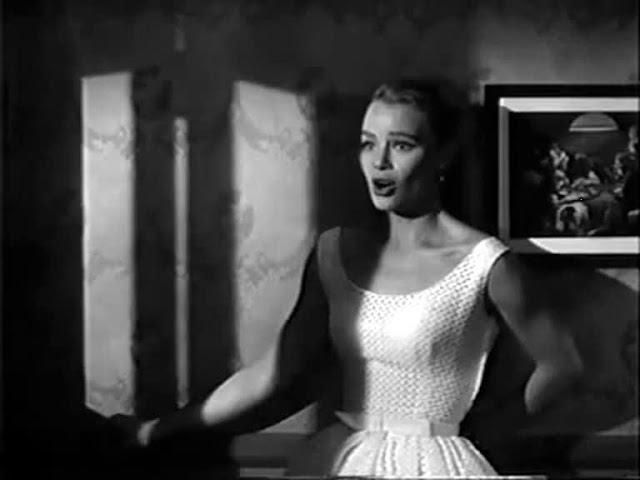
It’s Shakespearean pastoral played out as urban post-noir, a comedy of lack-of-manners, offering Edward Hopper framings but ripping through that artist’s blasted alienation with a good-humoured truculence that matches the rock’n’roll music on the soundtrack in honest appeal to hip-wiggling carnality. Jigger and Joey prefigure the neurotic gangster thesis of Corman’s Machine-Gun Kelly (1958), but the film as a whole is Corman and Griffith’s smart-aleck explanation of their own situation: low men on the Hollywood totem pole, sticking it to the man any way they can. Al presses Steve to compose an article that will give the Cloud Nine fame and prosperity, but constantly demurs. Steve is the Wriuter, but serves more as the metaphorical critic (or producer’s voice), anticipating the self-censuring projection provided by Carini in 8½ (1963). Confronted by the altercations of Angie, Shorty, and Mabel, Al prods Steve to beat it up: “It all took place in Al’s Cloud Nine…little guy made a big guy step down.” To which Steve ripostes dubiously, “That’s an instant. A story has to have a beginning, a middle, and an end.” You can practically hear Corman laughing in reading Griffith’s script, reflecting back at him the problem of composing a film around not any specific genre mode but a commercial exploitation of a musical fad, so instead helping invent meta cinema. So Shorty’s left to become the auteur, pushing the more appropriate protagonists – a dozen characters in search of an author – to live up to their postures and potential, or get out of the way.
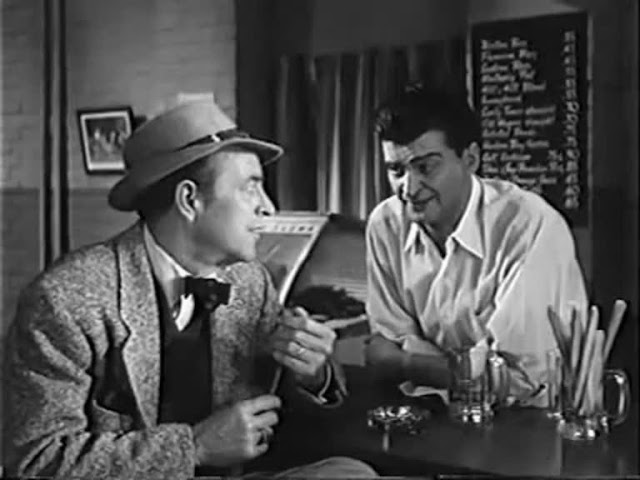
And, naturally, with Shorty writing the script, the big guys wimp out, the mobster reveals his cravenness, the Kid grows up by admitting he’s scared, small businessman Al finally grows a pair, and Jigger plugs a guy in the back but can’t stand up to a man in his face. Only Julie finds her voice in the eye of terror: “Oh yes, I’m the great pretender,” Julie croons terribly early in the film, but finds her inner chanteuse with a gun pointed at her gut. The film’ bargain-basement sparseness keeps stylistic flourishes to a minimum, but Rock All Night still possesses the stringent, functional clarity of Corman’s filmmaking at this point. Floyd Crosby’s camera carves the bar room up into miniaturist studies as sharply composed as the prints that hang on Al’s walls and edge their way into frames. The triptych of The Kid with his angel and devil consciences on either side has the flavour of Dutch masters. Julie, when forced to sing, is pushed out of the bald lighting of the rest of the movie into a film noir sketch of shadows. The mutually brutal comedy act of Angie and Mabel is noted as a hunched-over cartoon. Corman pulls off one great shot of pure pulp force, as a panicky visitor to the bar makes a bolt for the back door, springing from the very rear of a shot to ultra-close-up, only for Jigger to gun him down, his yawing mouth and shocked eyes glimpsed in a colossal blur. The band plays off each character at the end like a Love Boat episode send-off, after Shorty finally defeats the bad guys by proving he has the guts to match his big mouth, and he gets the girl for his pains. Polanski’s Cul-de-Sac (1966) would revisit the same basic idea but invert the hero’s pay-off to tragedy. A small, very rough gem from one of the great cinema mavericks.
